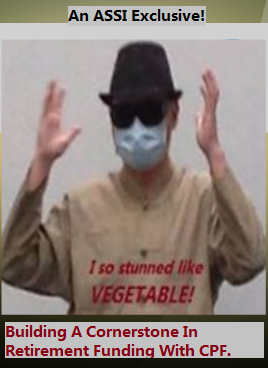A friend told me that the middle class in Singapore is rich and they have plenty of money for investment. That is probably just a guess. So, I would also hazard a guess to say that many are probably leveraged up to invest in properties and that they are not all cash rich per se.
Notice how it is new launches which are doing well? This is evident in January and Februarys' sales figures. The resale market has gone very quiet. Why? Obviously, one reason is the initial financial outlay is smaller for new launches and payments are made progressively. If all of these buyers are really cash rich, they would be more active in the resale market because, frankly, right now, many times, there is better value in the resale market and these investors would also be able to benefit from rental income right away.
I believe that a big wave of more marginal investors will get hit when the oversupply situation becomes increasingly apparent in residential and commercial properties. Yes, commercial properties too. Rentals have been declining and will probably continue to decline for some time as more new space becomes available.
People leveraging up and buying newly launched properties in anticipation of bigger returns 3 or 4 years down the road when the properties get their TOPs are playing a very risky game. It takes time for stock of real estate to build up and just like arsenic which kills the victim slowly over time, oversupply which builds up over months and years might catch some people unaware.
Of course, there is the argument that unless there is a big external shock, property prices in Singapore will stay resilient. Do we feel that the eurozone's problems are truly over? Do we feel that China's economy is iron clad? Is there no chance of a big external shock taking place? With prices having doubled or more in the last decade and up by 50% or more in the last three years alone, a big external shock could produce a real shocker of a price fall.
We also have people like CDL's Mr. Kwek and CPL's Mr. Liew who say that they have very strong balance sheets and that they do not have to slash prices to move stock. However, these are public listed companies. They have to account to shareholders. Sit on unproductive stock or rent them out upon completion in an environment of weakening rentals even if they are 99 years leasehold properties? I think not.
Also, do not underestimate the political will of the PAP government to reign in the prices of residential properties to make them more affordable. This is also why there is a requirement for developers to sell out any project within a 5 year period from the time they acquired the land or else be slapped with an additional stamp duty. If the developers play punk, expect additional measures from the government.
There has been complaints aplenty regarding the rising cost of doing business in Singapore and a big complaint is that of rental. Everyone was surprised when the government recently said that they would keep an eye on REITs to make sure that they are not driving up rentals in any anti-competitive manner. Cooling measures for industrial and commercial properties on the way, perhaps?
-----------------
Non-landed home prices in the secondary property market in Singapore continued to soften in the first quarter of 2012, with those in the prime districts 9, 10 and 11 faring worst.
According to a report by DTZ Research, resale prices of luxury condominiums and freehold condominiums in the prime districts fell by 0.8 per cent and 0.7 per cent respectively.
Resale prices of leasehold condominiums in the suburban areas registered a slight quarter-on-quarter increase of 0.3 per cent, a moderation from the 1.0 per cent growth in Q4 2011.
Transaction of non-landed homes also slowed to about 470 units per month over January and February. This was also lower than the monthly average of about 1,400 units in 2011.
Source: CNA, 21 March 2012.
Related posts:
1. Leverage up and buy investment properties now?
2. Selling a private property just got harder.

















33 comments:
hi AK,
so for someone who wants to invest in property, your advice will be to wait till it to crash first?
Hi Ray,
If you are asking for my personal opinion, I feel that chances of a crash are low but chances of a slow downward drift in prices from now till 2014 are rather high.
However I look at it, the upside in property prices looks almost non-existent in the next couple of years.
For sure, it is safer to wait a while rather than to rush headlong into a purchase. Of course, if we are sure that it is a good buy, then, go ahead. ;p
but why are we still hearing of 5 room flats selling for $800K in TPY area? Do you think HDB and Private properties prices are non or even negatively correlated?
Hi Ak71,
Seriously people are going crazy nowadays. Just look at the COE CAT B, the ever rising property prices despite cooling measures and all other luxury items. Are there so many rich people in Singapore or is it just the foreigners? I wonder how many people actually have the money to sustain their high ego?
Are we seeing a similar kind of a sub-prime mortgage bubble that is going to explode like the one in 2008?
AK
Agree with u again. Unless is a seasoned property investor (pick the right price and the right item) and deep in pocket, else for those leverage up and "chiong" into market kind.."God Bless Them".
For the commercial, my personal view. It is deemed to come, not only to curb speculation, also provide a "healthier" business environment. Besides capital is cheap, human and land is getting pricier for entrepreneur or rather businesses.
meesiam78
Hi Ray,
Indeed, why? ;)
I believe that HDB flats' resale prices will soften in the next few years. Already the COVs have been coming down in the last few months.
HDB flats' resale prices will continue to weaken because of the record number of BTOs, Executive Condos and condos completing. We will see less demand for resale HDB flats. We will see upgraders selling their HDB flats as they move into their new condos.
Everything points to an impending stronger oversupply situation that will make real estate more affordable in Singapore.
Hi INVS 2.0,
Yes, when I read that COE for big cars are now $80,000 a piece, I was speechless. Amazing, isn't it?
I bought my 1.5 litre Mazda 2 one and a half years ago for $70K and I thought that was expensive.
As for whether we would suffer a sub prime crisis like the USA did, it is improbable. Banks here are quite prudent and the requirement to put down 20% to 40% downpayment on purchases plus the healthy employment level means that margin calls and defaults are rather unlikely.
I believe softer prices are probable because of oversupply which would grow in the next few years. One should also bear in mind that interest rates are probably as low as it would get.
People are becoming complacent perhaps.
Hi meesiam,
As I am not a very good cherry picker, I better stay sidelined for now. ;p
I also feel that it is a matter of time that the government implements some measures with regards to commercial and industrial properties here.
The govt has already started to look at how some industrial units are being used as offices; but having said that, I reckon there will not be any hard measures being imposed on Commercial/Industrial sectors. These sectors consist mainly the sophiscated investors and institutional funds and the govt is unlikely to 'disturb' the market and will just let market forces to decide, as long as they follow the current rules.
Private new home sales might be looking good on paper, but the fact is developers are getting creative in marketing the new launches, pricing them in affordable quantum by reducing the sizes (we just seen a 3-br unit of less than 700sf being launched this week).
Hi BC,
Natura @ Hillview. 3 bedder, 635 sq ft. $1400+ psf. This might actually do well if it were located in RCR. It is located OCR and about 1km away from the nearest MRT station at Bukit Gombak. I wouldn't touch this but that's just me. It might just sell out. People might just want a freehold property "cheap". Who knows?
As for commercial and industrial properties, with quantums similar to buying small apartments at $500,000 to $700,000 a unit, they are attracting the uncles and aunties too these days. So, I am not sure if the government would not intervene. Would be interesting to see how things go.
Developers are indeed very creative in getting investors to plonk down money. Keeping the quantums low is a sign that they are scrapping the bottom of the pot as it makes investments "affordable" to anyone who has at least $200K of extra cash.
Seeing how property prices have soared in the last 3 years, people who have managed to save some money as the economy boomed in the same period are keen to invest in properties but is the party coming to an end? Do they have intermissions at parties? ;p
Hi AK71,
Agree with your views. I missed out on the "5 years developers time frame once they got the land to sell or else they get slapped with a stamp duty." No wonder my friend said the developer has been bugging him to close fast and reducing the price without much bargaining. Its still too high though.And very good point on the observation that new launches are doing better thn resale. :)
Hi TOOTB,
Hope you don't mind me shortening your nick. ;)
You are not alone. Few remember that developers must now sell out their projects within 5 years of acquiring the land. It is something that is not frequently reported and, of course, the developers will not remind us of this fact either. ;)
From the moment a piece of land is acquired, it takes a developer anything from 9 to 12 months to launch the project, sometimes longer. That leaves them 4 years to sell out the project. For them to break even, depending on whether they want a 20% or 30% margin, they would need to sell at least 70% to 80% of the project fast. This is why any project that is at least 70% sold, the developer becomes more nonchalant. Not desperate anymore. ;p
Cheap credit is making many take risks. Of course, the parallel argument is that the very low interest rates banks pay on savings are pushing people to find higher returns for their money. I know, I hear it all the time.
I like your observation AK.
I not a property investor yet, so can't add comments that's backed with personal experience.
But as a salesman, I can say this:
When there are long queues of buyers queuing overnight at the showrooms, do developers need to advertise their launches?
Now we see lots of colourful ads in the papers and TV every day.
When was the last time you saw property launches using TV ads?
Not only that, developers are
using their contacts in the media and industry to "talk up" property. Some are in the guise of seminars, some are in the form of books ;)
The question to ask is:
Are buyers in a hurry to buy; or are developers in a hurry to sell?
Hi SMOL,
As a fellow salesman, I agree with your observations. Convincing clients to part with as much of their money as possible is an art. Some do it better than others.
Indeed, developers are pulling out all the stops to sell their newly launched projects. What we read about and what we hear about are those projects which have been marketed well and have sold well.
There are many more which are not doing as well and we don't hear about them.
Of course, we should not forget the thousands of listings on PropertyGuru, for example. The secondary market is flooded with sellers and fewer buyers.
What is also notable is that projects which received their TOPs in recent months are seeing hundreds of listings to sell or rent. This tells us that a vast number of these buyers are investors and not owner-occupiers. This is another sign that the market is on its way to being a buyers' market.
With the oversupply situation more or less confirmed, developers are still taking part in GLS because they are fearful of losing out to the competition. So, there will be more building and prices will come down. It is basic economics.
Economics plus a political will to see lower property prices is a lethal combination. I would wait a few more months or even a year to see if asking prices become more reasonable.
Hi guys,
If there are fewer buyers, would that mean people renting will be fewer as well?
With the cuts by the govt on the number of EP they are giving out, I believe the rental sector is going to be worse, if its not already very bad now.
With all these in play, buying properties will no longer be very profitable.
Any thoughts?
Hi Ray,
Rental demand has definitely weakened and the constant supply of newly completed condos adds downward pressure to rental.
I know two cases personally in which tenants are offering significantly lower rentals when renewing their contracts. One went from $5,300 to $4,500 (980sf 2 bedder) and one went from $4,300 to $3,500(690sf 1 bedder). Both are located near MRT stations in the city fringe.
Rental market is softening and the vacancy rate has gone from under 5% to more than 6% now.
As the value of an investment property is a function of NPI yield amongst other things, it is logical to expect property values to soften in time.
Hi AK, thanks for helping to address my queries. But would u say given the low interest rates now and property prices only climbing slower (not dropping), buyers of new condo now can still make money by selling it off at a marginally higher price compared to a few years ago where it might be double the price.
Hi Ray,
Interest rates won't stay this low forever. Till 2014 is a good guess.
Anyone who is thinking of buying and selling a property now within a 4 years period will have the seller's stamp duty to think about.
If he sells within the first year, he would have to pay 16% stamp duty to the government. 12% in the 2nd, 8% in the 3rd and 4% in the 4th. Selling at a marginally higher price and make money? Seems much harder now. ;)
Singapore on Friday set a maximum tenure of 35 years for all new residential property loans as part of new measures to cool its housing market.
The new rules, which take effect from Oct 6, apply to both private homes and government-built Housing and Development Board (HDB) apartments, the Monetary Authority of Singapore (MAS) said in a statement.
“Over the last three years, the average tenure for new residential property loans has increased from 25 to 29 years. More than 45% of new residential property loans granted by financial institutions have tenures exceeding 30 years,” MAS said.
“The new rules aim to curb continued upward pressure on residential property prices, driven by low interest rates and rapid credit growth,” the central bank added.
REUTERS, 5 OCT 12.
The Monetary Authority
of Singapore (MAS) has capped all new residential property loans at 35 years wef 6 October 2012. For loans to individuals, if the tenure
exceeds 30 years or if the loan period extends beyond the retirement age of 65, the loan-to-value (LTV) will be capped at 40% if the borrower already has one or more outstanding residential mortgage, and 60% if he has none.
Marginal buyers likely to be weeded out. Our sensitivity analysis shows that for a SGD1 million loan, the monthly mortgage payment increases by nearly 13% to SGD3,451 on a base case interest rate of 1.5% p.a. when the loan tenure is reduced from 35 years to 30 years. We believe that marginal buyers will increasingly be forced out of the market if they deem the increase in monthly payments excessive, or if they do not have enough cash on hand for the higher downpayments should they insist on taking loans exceeding 30 years, or beyond the retirement age.
Since the mass market segment has more marginal buyers/investors, we expect the latest measures to tip the segment closer to a 10% correction by end-2013. However, in the short term, we see mass market demand still largely being supported by the tight labour market. On the other hand, we expect the measures to have little or no impact on the high end
segment. This is because the wealthy buyers tend not to be too
highly-geared in the first place, and they can stomach the marginal
increase in monthly payments.
We view the latest round of cooling
measures as necessary to remind both potential homebuyers and
financial institutions of the importance of financial prudence in the continued low interest rate environment. Raising the LTV and reducing the loan tenure are the next best alternatives to raising mortgage lending rates directly.
Kim Eng, 9 Oct 12.
More property cooling measures announced
11 January 2013, CNA
The Singapore government on Friday announced additional measures to cool the residential property market.
The ABSD will now be extended to permanent residents buying their first residential property and on Singaporeans buying their second residential property.
The minimum cash downpayment for individuals applying for a second or subsequent housing loan will be raised from 10 percent to 25 percent.
Permanent residents (PRs) who own a HDB flat will also not be allowed to sublet their entire flat.
PRs who own a HDB flat must sell their flat within six months of purchasing a private residential property in Singapore
There are also new measures to ensure that executive condominiums (EC) remain affordable for middle-income Singaporean families.
The maximum strata floor area of new EC units will be capped at 160 square metres.
Sales of new dual-key EC units will be restricted to multi-generational families only.
Developers of future EC sale sites from the Government Land Sales programme will only be allowed to launch units for sale 15 months from the date of award of the sites or after the physical completion of foundation works, whichever is earlier.
Private enclosed spaces and private roof terraces will be treated as gross floor area (GFA). The GFA of such spaces in non-landed residential developments, including ECs, will be counted as part of the "bonus" GFA of a residential development and subject to payment of charges.
For the first time, the government has also introduced a seller's stamp duty (SSD) on industrial property to discourage short-term speculative activity which could distort prices and raise costs for businesses.
The SSD will apply to industrial properties and land bought and sold within three years of purchase.
A rate of 15 percent will be imposed on industrial properties sold within the first year of purchase. This will go down to 10 percent for those sold in the second year of purchase, and to 5 percent for those sold in the third year of purchase.
Macquarie says:
"Slower population growth implies slower housing demand. This trend will play out against a backdrop of record completions," it says, noting a combined 200,000 public and private housing units due to come on stream through 2016.
Singapore has imposed steps to cool the housing market since 2009, with the last round in January including an increase of as much as 7% in stamp duties. The finance minister said he is “pretty confident” that the government will get a handle on the situation.
“We’re still in a wrong part of the cycle,” and there is still “some ways to go” before prices are at an acceptable level, he said. “It’ll happen through a combination of income improvement, as well as prices certainly not going up further, but some correction in prices will not be out of order.”
While the government will never be able to tame the “sentiment-driven” market, it has to limit gains because of the social impact when people can’t afford to buy homes, Shanmugaratnam said.
“We can prevent a real bubble from being formed which then eventually crashes, and that’s our objective,” said the minister, who obtained his master’s in economics from the University of Cambridge and holds a master’s in public administration from Harvard University in Cambridge, Massachusetts. “We can’t use the full arsenal in one shot,” he said, referring to seven rounds of property curbs since 2009.
Bloomberg, 1 March 2013.
In Singapore, curbs including a seller's stamp duty and increased taxes for foreigners and corporates were introduced in January, rounding out the nation's seventh round of cooling measures in the last four years.
While the curbs do temporarily affect transaction volumes, according to Wee Liat Lee, managing director, head of property research, BNP Paribas Securities Asia, demand usually returns in Hong and Singapore six to eight weeks after the measures and then the tightening cycle continues.
"When volumes start to come back and start to accelerate, the government will have to tighten further," Lee said. "It will be slow volume, then the return of volume and then more tightening."
Despite the continuous measures by the governments, prices remain stubbornly high. Prices for private homes in Singapore have risen almost 60 percent since mid-2009. In Hong Kong, home prices have jumped 120 percent since 2008, while prices in China's 100 biggest cities rose for the ninth straight month in February.
Hong Kong's last property crash, when prices fell 50 percent in 1997 during the Asian financial crisis, was triggered after former Chief Executive Tung Chee-hwa announced plans to add as many as 85,000 housing units to cool prices. That extended a prolonged slump in the markets that lasted six years.
So what would undo the uptrend in prices? Analysts said it will come down to a macro development like an economic downturn or rising interest rates, both of which are unlikely in the near term.
"The reason why the prices aren't coming down is because the cost of holding on to properties is way too low, so if you want the property price to come down, there must be sellers in the market," Lee said. "The sellers will come back when the cost of holding the property increases - when they're paying a higher mortgage rate."
CNBC, 8 Mar 2013.
I have put up a chart on my Facebook page to give a visual representation of the upcoming housing supply. We will refresh the chart with each GLS/BTO update.
For those contemplating buying a property, please study these websites and be prudent. Do bear in mind that the current low interest rate is unusual, and the normal high interest rate will return in time to come.
See Minister Khaw's blog post: here.
Hi AK71,
what is the link to your facebook page with the chart?
Hi Sanguine,
Oops, these are Minister Khaw's words. Please click on the link to his blog. :)
The Monetary Authority of Singapore (MAS) has set new home loan rules which discourage lenders from making property loans that result in individual borrowers using more than 60 per cent of their monthly incomes to service debt.
When working out loans to be granted to home buyers, banks will have to consider the monthly repayment for the property loan that the borrower is applying for, plus all his other outstanding debt obligations.
Banks will also have to apply a specified medium-term interest rate or the prevailing market interest rate, whichever is higher, to the property loan that the borrower is applying for.
The financial institutions will also have to discount at least 30 per cent of the borrower's variable income, such as bonuses, and rental income.
MAS said its inspection of banks showed uneven practices with respect to the application of debt servicing ratios and highlighted areas for improvement in credit underwriting practices.
Source:
http://www.channelnewsasia.com/news/singapore/mas-sets-new-home-loan/727950.html
Monetary Authority of Singapore (MAS) said the move aims to encourage financial prudence and cool demand.
David Teo, a potential property buyer, said: "If you have a car now, maybe with the 50 per cent down payment and with the car prices now, then of course more of your income will be locked up in your car. But if you got your first house, then if you're really stretching yourself, then you shouldn't really go for it.”
MAS said any property loan should not push a borrower's total debt obligations to above 60 per cent of his or her gross monthly income.
Source:
http://www.channelnewsasia.com/news/singapore/new-home-loan-rules-may/728792.html
Deputy Prime Minister and Finance Minister Tharman Shanmugaratnam on Sunday said that the latest home loan rules are not another round of property cooling measures, and that the market is showing signs of stabilising.
Mr Tharman said the new Total Debt Servicing Ratio Framework is a long-term rule to get banks to start practising prudence when it comes to total debt.
Source:
http://www.channelnewsasia.com/news/singapore/latest-home-loan-rules/736738.html
Malaysia's central bank has imposed measures on household lending, including limits to loan tenures, which economists on Sunday said will reign in "excessive" consumer borrowing and curb property speculation.
Bank Negara Malaysia said it will now only allow personal loans of up to 10 years while financing for both residential and non-residential properties will have a maximum payback term of 35 years.
Previously, consumers were allowed to apply for personal and property loans of up to 25 years and 45 years respectively.
The central bank also announced a ban on "pre-approved personal financing products" -- unsolicited loan and credit card offers -- effective immediately.
Source:
http://www.channelnewsasia.com/news/business/international/malaysia-tightens/736632.html
Home prices in Singapore may have been moderating for several straight quarters now, as cooling measures introduced by the Government continue to take effect.
However, while taking questions at the DBS Asian Insights Conference, Deputy Prime Minister and Finance Minister Tharman Shanmugaratnam said the cycle is "not over".
"Market players will determine where the cycle goes. I don't think the industry will crash, because we moved early enough, and we moved each step of the game, knowing full well that what we do may not be enough, but knowing too well that if we did too much, it may engineer a crash," said Mr Tharman.
"So we moved step by step, but we started early, so we avoided a huge bubble. That's why we won't see a crash. But I think further correction would not be unexpected."
http://www.channelnewsasia.com/news/singapore/further-correction-in/1235320.html
The property market may be stabilising but it is still "too early" to ease the cooling measures that were introduced in recent years, the Monetary Authority of Singapore (MAS) said on Thursday (July 24).
This is because home prices remain elevated while global interest rates are at historical lows, MAS Managing Director Ravi Menon said.
Speaking at the release of MAS' annual report for the 2013/14 financial year on Thursday (July 24), Mr Menon said property prices have risen 60 per cent over the last four years but have declined by just 3.3 per cent over the last three quarters.
He also said relaxing property measures at a time of low interest rates may set off another spiral of price increases.
Some Singapore households remain highly leveraged, and they would need time to reduce their debt levels, he added.
Source:
http://www.channelnewsasia.com/news/singapore/too-early-to-ease/1280068.html
Post a Comment